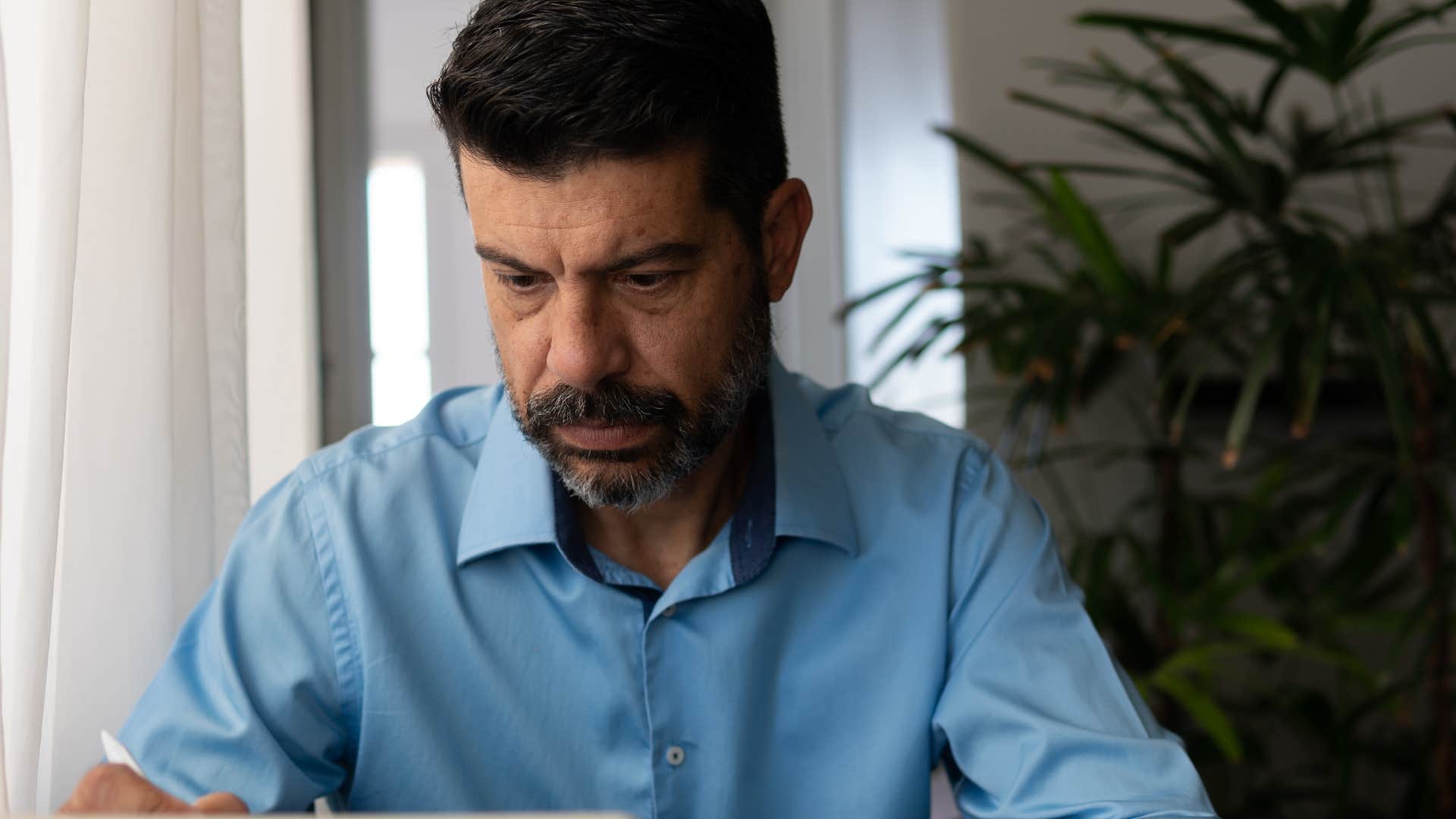People Who Still Use Actual Checkbooks Usually Believe In These 11 Old-School Principles
They care about tradition.
 Andrey_Popov | Shutterstock
Andrey_Popov | Shutterstock Even though the majority of people have transitioned to fully digital technology to manage their money and finances, there are still many people who prefer paper, tangible alternatives. From balancing their checkbook by hand to sending bills in the mail, this rare demographic of people is much different from the greater population — half of whom haven’t written a single check in years.
Of course, it’s not actually about being entirely mistrusting of technological options, but rather a reliance on the “old-school” nature of checkbooks and tangible financial tools that they appreciate. From financial discipline to literacy skills that were originally taught on paper, people who still use actual checkbooks usually believe in these old-school principles.
People who still use actual checkbooks usually believe in these 11 old-school principles
1. Never rely completely on technology
 insta_photos | Shutterstock
insta_photos | Shutterstock
Most older generations who primarily use paper financial options aren’t entirely turned off by technology. In fact, according to a Razorfish study, 70% of baby boomers are open to new technology and eager to learn more. So, it’s not necessarily a matter of mistrust that pushed people to continue using old-school checkbooks, but rather an appreciation for old-school principles.
They appreciate the tangibility of doing things with their hands, and most importantly, never want to rely on technology — even if there’s only a small chance that something will go wrong. They still believe that technology should be largely for entertainment, rather than for convenience in other aspects of life.
2. Financial responsibility is a science
 fizkes | Shutterstock
fizkes | Shutterstock
People who rely on their checkbooks and do all their financial management on paper believe that tracking money is an exact science. They’re not guesstimating the money in their bank account or letting unrestricted expenses go through without acknowledging them — they’re tracking things down to the last penny.
While this might be more tedious and stressful than simple, ignorant bliss, these people tend to waste less money every year. They’re not paying for things they don’t use or don’t know about, but instead follow through on every expense that comes out of their bank.
Of course, around half of U.S. adults lack basic financial literacy skills, so it’s not surprising that they’re letting money be wasted and struggling to manage their money in a healthy way, both online and offline.
3. The importance of privacy
 fizkes | Shutterstock
fizkes | Shutterstock
Even if managing and handling money in our lives seems superficial and harmless, the beliefs we have about finances often tie into every aspect of our lives. According to a study from the Journal of Social and Personal Relationships, money is inherently rooted in the well-being of relationships, especially the “money scripts” and values a person keeps about their finances.
People who still use actual checkbooks often have unique, old-school money scripts that play a role in all of their choices, but often influence the things they share. They care about privacy, obviously, because of their tangible money habits, but that appreciation for control influences every aspect of their routine.
4. Old-fashioned habits and rituals are worth preserving
 Inside Creative House | Shutterstock
Inside Creative House | Shutterstock
Creating healthy habits and sticking to a routine often brings a layer of stability and well-being to our lives that are often missing when we lack structure, at least according to a study from the American Journal of Lifestyle Medicine.
Old-fashioned habits may look different for everyone, but for people who still manage their finances on paper and use an actual checkbook, they largely believe that the routine of it is what’s important. Even if everyone else does it all online and appreciates the convenience of it all, doing it by hand, intentionally on paper, is what they appreciate and enjoy.
5. Debt is something to vehemently avoid
 Vergani Fotografia | Shutterstock
Vergani Fotografia | Shutterstock
Financial worries often provoke a kind of psychological distress. However, people worry about different things depending on their financial situation and often find themselves following habits that allow them to control their anxiety and fears around money.
For people with old-school ideas about taking on debt and using credit cards, their anxiety may revolve around carrying a balance month-to-month or taking on loans without discretion. So, when it comes to managing their money, they’re careful about budgeting down to the dime, planning strictly ahead, and using checkbooks to balance their money.
6. ‘If it’s not broke, don’t fix it’
 Branislav Nenin | Shutterstock
Branislav Nenin | Shutterstock
Studies show that many children build mindsets and habits around money from their parents at a much younger age than we realize. So, if someone grew up in a time where paper financial management and balancing checkbooks were the norm, chances are they’re more likely to stick to them today.
They live under the mentality that if “it’s not broke,” there’s no reason to “fix it.”
7. Financial paper trails are protective
 Lazy_Bear | Shutterstock
Lazy_Bear | Shutterstock
Rather than trying to protect your information and keep track of a million passwords online, people who still use actual checkbooks usually believe in old-school principles like “paper trails.” They believe that having a tangible paper trail to protect you and your money will always be more valuable than keeping everything online.
Even if it feels unrealistic to consider a day when the Internet goes away or we don’t have access to everything we currently have online, it’s a reality that many old-school people think about every day.
8. Integrity is important
 insta_photos | Shutterstock
insta_photos | Shutterstock
Even if the “old-fashioned” way takes longer, people who still use checkbooks clearly don’t mind putting in a little extra time and effort to maintain tradition. That’s why it’s not necessarily surprising that integrity in every sense of the word is so important for these people — they care about doing things the right way, even when they’re behind closed doors or it takes more time to do them.
Like psychology professor Jessica Koehler suggests, when people act in line with their values, maintaining a sense of integrity, they boast greater mental health and well-being. So, even if tradition isn’t everyone’s cup of tea, it ensures an old-school person lives a more authentic, happy, and healthy lifestyle.
9. Convenience should never replace accountability
 Lopolo | Shutterstock
Lopolo | Shutterstock
Many people are overly concerned about protecting convenience in today’s world, whether it’s through the Internet with online accessibility options or simply cutting corners to protect their own comfort. Even if it’s a sign of their need for instant gratification, they often prioritize convenience over things like accountability, the art of waiting, and personal regulation skills.
People who still use actual checkbooks usually believe in old-school principles that focus more on accountability and personal responsibility than on prioritizing convenience.
10. Track anything and everything
![]() Geber86 | Shutterstock
Geber86 | Shutterstock
Whether it’s their own personal biometrics, their financial expenses and bills, or their long-term plans, people who still use actual checkbooks usually believe in these old-school principles — they value the control, security, and power that tracking provides.
They like to be in the driver’s seat, not worried about relying on a computer or the Internet, so they tangibly manage their money and every other aspect of their lives on their own, offline.
11. Attention to detail is worth it
 Krakenimages.com | Shutterstock
Krakenimages.com | Shutterstock
Even if today’s world is reliant on convenience, cutting corners, and protecting personal comfort, a person who still pulls out their checkbook every day to pay for things likely cares about attention to detail.
Even if it takes them more time and effort to complete, they care about being detailed and upholding traditional habits and routines that bring a sense of order to their lives.
Zayda Slabbekoorn is a senior editorial strategist with a bachelor’s degree in social relations & policy and gender studies who focuses on psychology, relationships, self-help, and human interest stories.

